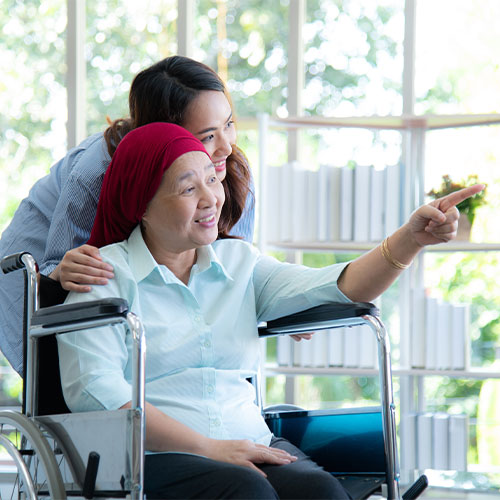Being diagnosed with cancer is difficult enough on its own and having mental illness due to that could make it even more challenging. It could affect the patient’s perspective of the problem as a whole and reduce one’s ability to respond to treatment. Patients need not lose hope as something can be done to alleviate the situation. Aside from getting assistance with physical symptoms, cancer patients can also gain mental health support from loved ones.
Although receiving a cancer diagnosis may drastically change the patient’s life, it does not necessarily mean that a death sentence has been handed over. Being diagnosed with cancer often leads to fear due to feelings of uncertainty on what lies ahead in terms of the series of tests, treatment options, response to treatment, and even side effects of treatment. For the majority of Filipino cancer patients, the cost of treatment can be very overwhelming. Fortunately, there are approaches to deal with the tremendous stress and anxiety caused by cancer diagnosis.
Here are some best practices you or your loved one might want to consider after getting a cancer diagnosis to sustain sound mental health throughout the cancer journey.
1. Accept that it is Okay to be Vulnerable
Being weak at certain periods in our lives is a natural aspect of being human. Even if cancer is one of the most common diseases around the world, getting diagnosed with it can still be shocking. You could experience a surge of emotions, such as sorrow, panic, anxiety, and rage. To protect relatives and loved ones from emotional shock, some cancer patients are forced to present a brave front.
Remember that it is normal to go through varied emotions. One might experience periods of intense fear and subsequent periods of feeling mostly optimistic. Keep in mind that you have every right to feel whatever it is you’re going through. You can let your tears flow or stay angry for a while. Don’t push yourself to always look calm and positive.
2. Keep the Lines of Communication Open
It’s common to feel like you want to disappear after learning you have cancer. While you may be tempted to keep it to yourself, sharing it would be helpful to keep focused on sustaining the best state of physical, emotional, and mental health while going through the needed tests and treatments. The ability to express your emotions authentically empowers both you and the people around you. Have honest, two-way communication with your loved ones, health care providers, and others. You are not obliged to share it on social media; you may choose to just share your diagnosis with your family and some closest friends.
By being honest with your loved ones, you may let them know how you prefer to be treated as normally as possible. You can even make a list of your treatment options as discussed with your doctor and decide which is best for you.

3. Maintain a Healthy Lifestyle
Cancer and its treatment can cause stress and fatigue. A healthy lifestyle can improve your energy level. Develop a consistent daily routine for exercising, getting enough sleep, and eating balanced meals. Talk to your doctor about activities and food choices to keep you up and running for the series of treatments.
4. Recognize Your Limitations
On the other hand, listen to your body when it urges you to take a break. Now is the moment to reflect on yourself and decompress. It’s okay to ask for some time off after learning that you have cancer, especially if you don’t have the drive or energy to move. Do not beat yourself up for not working or doing anything productive. Have a daily quiet time to reflect on what’s important in your life and do activities that meet your goals.
5. Get Help for Your Medical Expenses
Since cancer treatments are frequently very expensive, this may put a financial burden on the family. The psychological pressure that growing debt and unmet medical expenses create may cause patients to want to stop obtaining treatments.
Being honest with yourself while calculating your available funds can help. Speak with a trusted family member who is knowledgeable enough about health insurance policies. If you are financially challenged, be open-minded about asking your loved ones for a loan.
Understanding the type of cancer, risk factors, causes, symptoms, and treatment options including side effects and survival indicators is the first brave step to coping with cancer. Develop ways on how you can best deal with it together with your loved ones, close friends, co-workers, and your doctor.
If you’ve recently been diagnosed with cancer and want to learn more about navigating your journey including treatment options, access to treatment, and sharing stories with other cancer patients for mental health support, you can check out Hope from Within.
References:
https://www.mayoclinic.org/diseases-conditions/cancer/in-depth/cancer-diagnosis/art-20044544
https://www.cancerresearchuk.org/about-cancer/coping/emotionally
https://www.brainandlife.org/articles/how-to-share-diagnosis-with-friends-family
11 tips for coping with a cancer diagnosis – Mayo Clinic Health System








